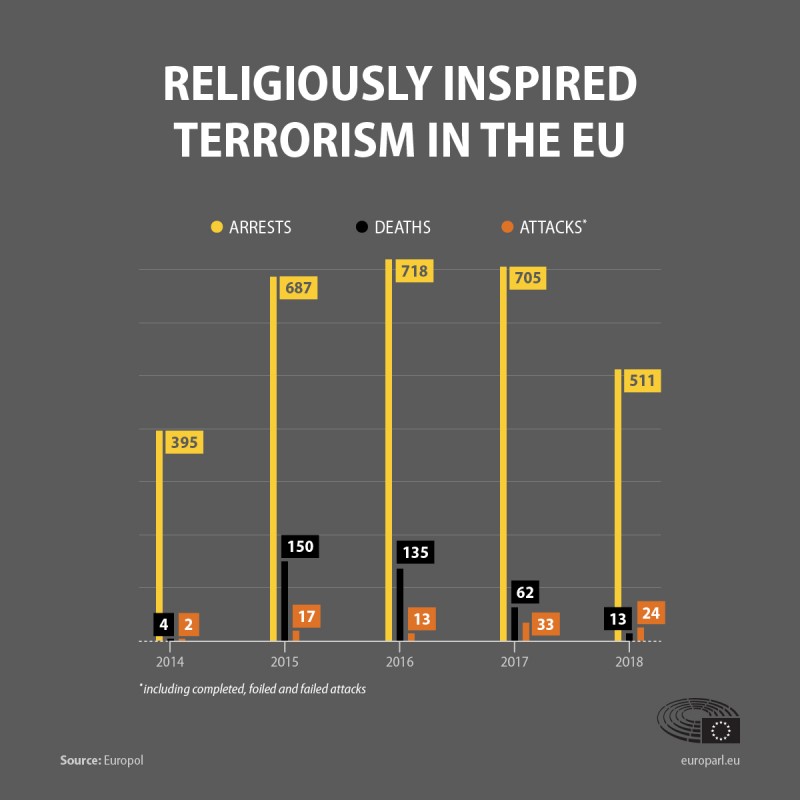- Home/
- News
Terrorism in the EU: terror attacks, deaths and arrests

Photo: The number of terrorist attacks and victims of terror dropped significantly in the EU in 2018. Check the graph to see evolution since 2014. (Europol, europarl.eu)
The numbers of victims of jihadist terrorism has decreased and the authorities managed to foil more attacks in 2018 compared to previous years. However, according to Catherine De Bolle internal threats to security are still high in the EU. Speaking at a meeting of Parliament’s civil liberties committee on 4 September, the Europol executive director said: “We have a low number of returnees [from conflict zones] but the concern remains high.”
Presenting Europol’s annual report on terrorist trends to MEPs, De Bolle said: “Hundreds of European citizens, including women and children, remain in detention in Iraq and Syria. In the conflict zones, while children are essentially victims, exposure to indoctrination and training may also pose a potential threat for the future.”
In 2018, terrorism continued to constitute a major threat to security in the EU. Attacks perpetrated by jihadists such as those in Trèbes, Paris, Liège and Strasbourg killed a total of 13 people and injured many more.
Less terrorist attacks and victims of terrorism
While 13 people lost their lives in 24 jihadist attacks in the EU last year, this compared to 62 deaths in 33 religiously inspired terrorist attacks in 2017.
Of the 24 jihadist attacks in 2018, 10 occurred in France, four in the United Kingdom, four in the Netherlands, two in Germany and one each in Belgium, Italy, Spain and Sweden.
A total of seven attacks - three in France, two in the Netherlands, one in Belgium and one in the United Kingdom - were considered by national governments to have been successful, four of these attacks were claimed by the so-called Islamic State. This figure represents a reduction compared to 2017, when 10 attacks of a jihadist nature were completed.
Foiled or failed attacks
In 2018, one jihadist attack failed in Spain while 16 incidents were reported as foiled jihadist terrorist plots, compared to 12 and 11 in 2017 respectively.
The completed and failed jihadist attacks were mostly carried out using knives and firearms, and predominantly targeted civilians. All attack plots involving the use of explosives were disrupted. The majority of the perpetrators were acting or were planning to act alone.
In 2018, 511 individuals were arrested on suspicion of offences related to jihadist terrorism. Most arrests occurred in France, the United Kingdom and Belgium, followed by the Netherlands, Germany and Italy. This figure is also lower than the previous year when a total of 705 people were arrested in 18 EU countries.
EU cooperation
Reinforced cooperation between EU countries and information sharing have helped to prevent attacks or limit their impact. According to De Bolle: “I am confident that the efforts of law enforcement, security services, public authorities, private companies and civil society organisations to counter terrorism have substantially contributed to the decrease in violence in Europe.”
“Faced with the surge in terrorist violence that Europe has witnessed since 2014, public authorities and private organisations that used to work largely separately have established new and creative ways of cooperation,” she added.
No systematic use of migration routes by terrorists
Some have been concerned about the risk posed by migrants trying to enter Europe. Europol’s report acknowledges that some terrorists have entered the EU posing as refugees but insists that this is not happening on a systematic basis: “There is no concrete evidence that terrorist travellers systematically use refugee flows to enter Europe unnoticed.”
Find out more
Find out more


 Development of specialized PCVE web site is funded by EU FUNDS CN 2017-386/831 - "IPA II 2016 Regional Action on P/CVE in the Western Balkans"
Development of specialized PCVE web site is funded by EU FUNDS CN 2017-386/831 - "IPA II 2016 Regional Action on P/CVE in the Western Balkans"